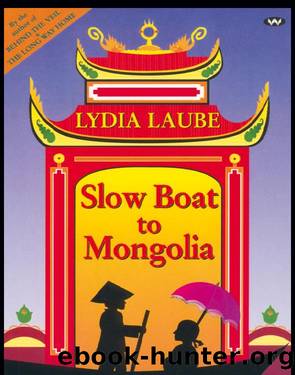Slow Boat to Mongolia by Lydia Laube

Author:Lydia Laube
Language: eng
Format: epub
Tags: BG
ISBN: 9781862549005
Publisher: Wakefield Press
Published: 2010-06-01T00:00:00+00:00
11 Into the mountains of Mongolia
By afternoon we had sped through the outer Chinese province of Hebei and were clickety clacking our way through Inner Mongolia. Bare hills rose gently behind plains of low grass and fields of barley and wheat, some of which was being harvested by cheerful workers. Armed with scythes, they straightened up among the stook-dotted fields to wave and smile as we passed. Others digging potatoes from large plots on the sloping sides of the train tracks, paused to watch and wave too. Behind them piles of big yellow spuds lay on the freshly dug earth.
Now and then I saw small flocks of sheep or goats, a few cows, or a man ploughing a field with two bullocks or a horse. The villages were large, with ugly, square brick houses, from which children rushed excitedly to wave as the train passed. Copses of birches, the shape of a closed umbrella, flourished along the railway line and around villages and fields. The air was clean and across the intense blue of the sky lolled a few white clouds.
Inner Mongolia is a Chinese autonomous region. This means that the people govern themselves, but in reality they are Chinese ruled, like the Tibetans. Try telling them they are autonomous. In the mid-seventeenth century the Manchurians of north-east China invaded southern Mongolia taking advantage of the internal strife among the Mongolian Khans. They made it a vassal state and named it Inner Mongolia. Since then the northern part of the country that managed to remain independent has been referred to as Outer Mongolia.
Primitive man settled in Mongolia 300,000 to 350,000 years ago. By the late third century BC the dominant tribes had united to form a strong nomadic empire. The harsh climate produced a tough people; by the year 1280 they had conquered half the world on horseback! The Mongolians had tenacity. Instead of hibernating during the severe winters, they waited for the rivers to freeze and rode over the ice to continue their campaigns. They went everywhere, at all times, and were afraid of only one thing â lightning. Stand out in the vast open grasslands in a storm and youâll understand why.
Temujin Ghenghis Khan was born about 1162. When he was young his father, the leader of the Kiyat-Borjigins, was poisoned by rival Tatars and subsequently his childhood and adolescence were times of privation and hostility. In 1206 he was made the Great Khan and given the Mongolian throne and the title Ghenghis Khan, universal ruler, by the people. He founded a strong centralised government that was more democratic than most countries then and many now. Despite his reputation for cruelty and vindictiveness he was fair and magnanimous, and he valued honesty above all else. A brilliant tactician and leader, he won his splendid victories due to discipline, organisation and skill. He is still described as the greatest military genius in history.
Ghenghis Khan died in 1227 after falling from his horse in a campaign, and is possibly buried in the Khenty Mountains.
Download
This site does not store any files on its server. We only index and link to content provided by other sites. Please contact the content providers to delete copyright contents if any and email us, we'll remove relevant links or contents immediately.
China Rich Girlfriend by Kwan Kevin(3899)
The Silk Roads by Peter Frankopan(3765)
Annapurna by Maurice Herzog(2844)
Hot Thai Kitchen by Pailin Chongchitnant(2815)
Full Circle by Michael Palin(2779)
Okonomiyaki: Japanese Comfort Food by Saito Yoshio(2391)
City of Djinns: a year in Delhi by William Dalrymple(2138)
The Ogre by Doug Scott(2116)
Photographic Guide to the Birds of Indonesia by Strange Morten;(2091)
Tokyo by Rob Goss(2021)
Vietnam, Cambodia, Laos & Northern Thailand by Lonely Planet(2015)
Tokyo Geek's Guide: Manga, Anime, Gaming, Cosplay, Toys, Idols & More - The Ultimate Guide to Japan's Otaku Culture by Simone Gianni(1949)
Discover China Travel Guide by Lonely Planet(1867)
Everest the Cruel Way by Joe Tasker(1828)
China (Lonely Planet, 11th Edition)(1799)
Lonely Planet China(1758)
China Travel Guide by Lonely Planet(1741)
Top 10 Dubai and Abu Dhabi by DK Travel(1718)
Iranian Rappers And Persian Porn by Maslin Jamie(1711)
